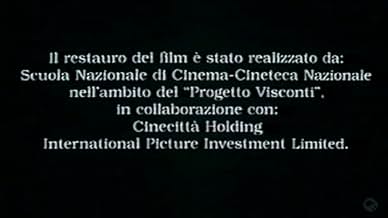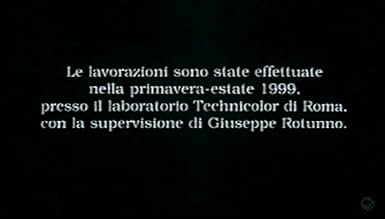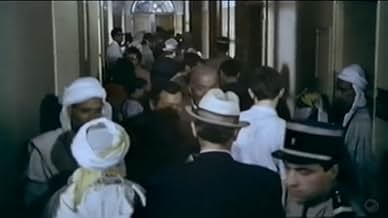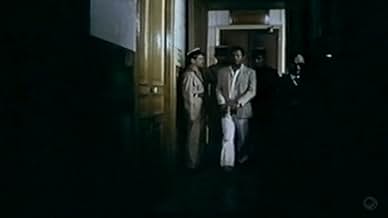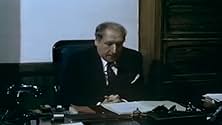IMDb RATING
7.1/10
3.4K
YOUR RATING
A man faces a trial for murder. The court is biased because of his personal qualities.A man faces a trial for murder. The court is biased because of his personal qualities.A man faces a trial for murder. The court is biased because of his personal qualities.
- Awards
- 4 nominations total
Jean-Pierre Zola
- Employer
- (as Jean Pierre Zola)
Featured reviews
Inspired by Albert Camus' seminal work of 1942, one is hardly likely to see a more faithful or indeed reverential adaptation than this.
It is easy to get bogged down in discussions as to whether or not Camus' piece is Existentionalist. He himself denied this and it is probably safer to say that if anything, it represents the philosophy of the Absurd.
The novel is written as a first person narrative by the 'Stranger' of the title although I have always felt the alternative title of 'The Outsider' to be far more appropriate. Arthur Meursault by name, he is the sheikh of apathy and his total indifference is evident in both his manner and such utterings as "It doesn't really matter" or "It makes no difference one way or the other." He cannot bring himself to show any grief at his mother's funeral and reacts impassively to his adoring girlfriend's suggestion of marriage. He is even unable to give a reason for his apparently motiveless shooting of an Arab other than "I think it was the sun." He simply does not behave as society dictates he ought and for his inability to play the game he pays the ultimate penalty.........
I cannot agree with the view that Marcello Mastroianni is miscast in the role. He had previously worked with Visconti in the cruelly underrated 'Le Notte Bianchi' of 1957 and during the intervening years he had become the finished article and excelled for Fellini, Antonioni, Bolognini, Germi and de Sica. Very few actors convey blankness or lassitude quite as well as he which makes his final rant against the religious platitudes of the prison chaplain so dramatically effective. By all accounts he lobbied for the role and turns in a splendid performance.
Visconti is the most 'operatic' of directors which is why he seems an odd choice for this austere, almost Bresson-esque material. He has of course the services of a fine cast, notably a touching Anna Karina as Meursault's lover, Georges Geret as a pimp, Bernard Blier as Meursault's feeble defence lawyer, Georges Wilson as an evangelical examining magistrate and Bruno Cremer as the prison chaplain.
The sun-baked imagery and oppressive heat are wonderfully captured by Visconti's chosen cinematographer Giuseppe Rotunno whilst Piero Piccioni, much favoured by Bolognini, contributes one of his most offbeat scores.
This is not really to do with plot but is all about 'mood'. Both novel and film are pervaded by a sense of 'Ennui', that evocative word that covers so many negative emotions.
The ultimate challenge is to make a film about boredom without its being boring. Has Visconti succeeded? On balance, with minor reservations, I think he has.
It is easy to get bogged down in discussions as to whether or not Camus' piece is Existentionalist. He himself denied this and it is probably safer to say that if anything, it represents the philosophy of the Absurd.
The novel is written as a first person narrative by the 'Stranger' of the title although I have always felt the alternative title of 'The Outsider' to be far more appropriate. Arthur Meursault by name, he is the sheikh of apathy and his total indifference is evident in both his manner and such utterings as "It doesn't really matter" or "It makes no difference one way or the other." He cannot bring himself to show any grief at his mother's funeral and reacts impassively to his adoring girlfriend's suggestion of marriage. He is even unable to give a reason for his apparently motiveless shooting of an Arab other than "I think it was the sun." He simply does not behave as society dictates he ought and for his inability to play the game he pays the ultimate penalty.........
I cannot agree with the view that Marcello Mastroianni is miscast in the role. He had previously worked with Visconti in the cruelly underrated 'Le Notte Bianchi' of 1957 and during the intervening years he had become the finished article and excelled for Fellini, Antonioni, Bolognini, Germi and de Sica. Very few actors convey blankness or lassitude quite as well as he which makes his final rant against the religious platitudes of the prison chaplain so dramatically effective. By all accounts he lobbied for the role and turns in a splendid performance.
Visconti is the most 'operatic' of directors which is why he seems an odd choice for this austere, almost Bresson-esque material. He has of course the services of a fine cast, notably a touching Anna Karina as Meursault's lover, Georges Geret as a pimp, Bernard Blier as Meursault's feeble defence lawyer, Georges Wilson as an evangelical examining magistrate and Bruno Cremer as the prison chaplain.
The sun-baked imagery and oppressive heat are wonderfully captured by Visconti's chosen cinematographer Giuseppe Rotunno whilst Piero Piccioni, much favoured by Bolognini, contributes one of his most offbeat scores.
This is not really to do with plot but is all about 'mood'. Both novel and film are pervaded by a sense of 'Ennui', that evocative word that covers so many negative emotions.
The ultimate challenge is to make a film about boredom without its being boring. Has Visconti succeeded? On balance, with minor reservations, I think he has.
Reviewing isn't really my thing. However, it seems that some information about this film, information that was only fully told when the film was restored in 2001, isn't easily accessible in English. So, here's the rundown:
1- during the long gestation of the project (from 1962), Visconti was often tempted to underscore the political side of the novel; this was shot down by the Camus family.
2- the first choice to play Meursalt was Alain Delon, but negotiations fell apart. In came Mastroianni, who offered to make the movie for half his usual pay. There was no way producer De Laurentiis would say no.
3- Visconti had envisioned a flashback structure to the film, with different viewpoints. The Camus widow imposed a writer of her choice (Roblès) to ensure literal faithfulness to the novel.
4- at this point Visconti tried to walk out, but he was bound to make this film by contract, and had to despite losing all enthusiasm. He was to remember it as his worst film.
Now for the vote. It is professionally done, and while Marcello gives a completely different take on Meursalt from the book - close your eyes and imagine young Delon instead - he gives it his best. A sufficient effort, if one does not think of what it could have been.
1- during the long gestation of the project (from 1962), Visconti was often tempted to underscore the political side of the novel; this was shot down by the Camus family.
2- the first choice to play Meursalt was Alain Delon, but negotiations fell apart. In came Mastroianni, who offered to make the movie for half his usual pay. There was no way producer De Laurentiis would say no.
3- Visconti had envisioned a flashback structure to the film, with different viewpoints. The Camus widow imposed a writer of her choice (Roblès) to ensure literal faithfulness to the novel.
4- at this point Visconti tried to walk out, but he was bound to make this film by contract, and had to despite losing all enthusiasm. He was to remember it as his worst film.
Now for the vote. It is professionally done, and while Marcello gives a completely different take on Meursalt from the book - close your eyes and imagine young Delon instead - he gives it his best. A sufficient effort, if one does not think of what it could have been.
The tragedy of Lo straniero (The Stranger) is accentuated by the terrific performance of Marcello Mastroianni who looks totally in character of Albert Camus's anti-hero in the popular novel on absurdism, nihilism, and apathy as well as by the linear, straightforward storytelling that is true to the novel and by the haunting score that just helps it conclude itself as a social drama that reflects the sometimes unbiased yet righteous-looking wisdom of the society. TN.
(Watched for free on YouTube.)
(Watched for free on YouTube.)
About as direct an adaptation from book to movie as you can get, this film version of Camus' famous novel by director Luchino Visconti raises interesting questions about the inherent difference between page and screen.
As much as Camus's first-person prose is included in the film in the form of voice-over, the fact remains that a movie can't get us inside the head of a character like a book can. This is highlighted all the more by the fact that Marcello Mastroianni is outstanding as Camus' Meursault, one couldn't ask for a better performance. Nonetheless, the sense one gets here of understanding (or not) Meursault's perspective pales to that of the novel.
On the other hand, even the most vivid prose cannot transport us to the physical reality of a time and place like a well made film. This version of The Stranger is as much about occupied Algeria in the early twentieth century as it is about Meursault or any of the philosophical questions that Camus was wrestling with in his novel. This version is more overtly political, literally showing the ways in which racism and colonialism shape the interactions of the characters.
As much as Camus's first-person prose is included in the film in the form of voice-over, the fact remains that a movie can't get us inside the head of a character like a book can. This is highlighted all the more by the fact that Marcello Mastroianni is outstanding as Camus' Meursault, one couldn't ask for a better performance. Nonetheless, the sense one gets here of understanding (or not) Meursault's perspective pales to that of the novel.
On the other hand, even the most vivid prose cannot transport us to the physical reality of a time and place like a well made film. This version of The Stranger is as much about occupied Algeria in the early twentieth century as it is about Meursault or any of the philosophical questions that Camus was wrestling with in his novel. This version is more overtly political, literally showing the ways in which racism and colonialism shape the interactions of the characters.
10ted-129
Visconti brings to life the Camus novel with the minimum of dialog and surreal visuals.
Algiers sweats. The sun's glare beats down and doesn't let up--right up to the courtroom scene where one watches a dazed Mastroianni in the foreground while the fans of the jury members move in constant motion in a soft-focus background. Much of the film has a dreamlike feel that fuses with the existential blankness felt by Mastroianni's character.
I recall this film playing frequently in San Francisco at the Times Theater back in the early stoner 70's. And with the 70's, this film has all but disappeared. One only hopes that all of Visconti's films will someday make it to DVD--but especially The Stranger!
Algiers sweats. The sun's glare beats down and doesn't let up--right up to the courtroom scene where one watches a dazed Mastroianni in the foreground while the fans of the jury members move in constant motion in a soft-focus background. Much of the film has a dreamlike feel that fuses with the existential blankness felt by Mastroianni's character.
I recall this film playing frequently in San Francisco at the Times Theater back in the early stoner 70's. And with the 70's, this film has all but disappeared. One only hopes that all of Visconti's films will someday make it to DVD--but especially The Stranger!
Did you know
- TriviaTwenty years before Visconti's adaptation, while Camus was still alive, the novelist had been approached with the idea of making The Stranger as a film by director Jean Renoir.
- Crazy creditsThe restoration of the film was carried out by: the National Film School - National Film Library, as part of the 'Visconti Project' in collaboration with Cinecitta Holding International Picture Investment Limited. The work was carried out in the spring & summer 1999, at the Technicolor Laboratory in Rome, under the supervision of Giuseppe Rotunno.
- ConnectionsReferenced in Costumes from the Films of Visconti (1978)
- How long is The Stranger?Powered by Alexa
Details
Contribute to this page
Suggest an edit or add missing content

